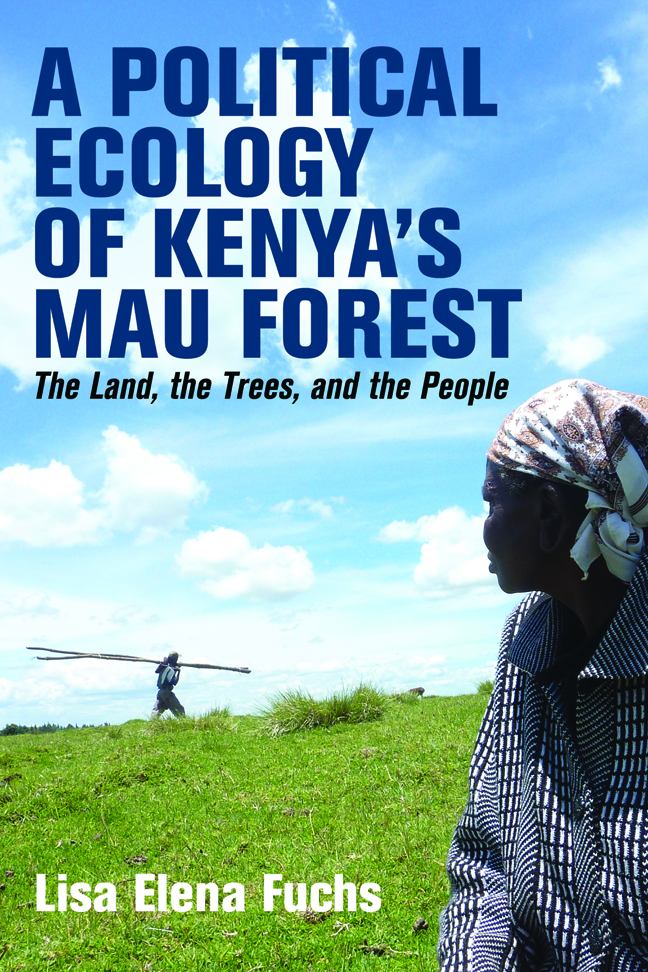Book contents
- Frontmatter
- Dedication
- Contents
- List of Illustrations
- List of Abbreviations
- Glossary
- Acknowledgements
- Introduction
- 1 The Politics of Conservation Aid: The Development State and ‘Saving the Mau’
- 2 Institutional Failure or Setting Priorities? The Continuation in Exploitation-focused Forest Management
- 3 The Political Economy of Land: Maintaining Control over Forest Land Allocation and Distribution
- 4 The Politics of Belonging and Exclusion in Response to Changes in the Eastern Mau: The Complex Definition of Legitimate Land and Resource Use
- Conclusions
- Appendix 1 Medicinal plants used and inventoried by survey respondents in the Eastern Mau in 2012–2013
- Appendix 2 Full overview of interview partners
- Bibliography
- Index
- Eastern Africa Series
4 - The Politics of Belonging and Exclusion in Response to Changes in the Eastern Mau: The Complex Definition of Legitimate Land and Resource Use
Published online by Cambridge University Press: 10 January 2024
- Frontmatter
- Dedication
- Contents
- List of Illustrations
- List of Abbreviations
- Glossary
- Acknowledgements
- Introduction
- 1 The Politics of Conservation Aid: The Development State and ‘Saving the Mau’
- 2 Institutional Failure or Setting Priorities? The Continuation in Exploitation-focused Forest Management
- 3 The Political Economy of Land: Maintaining Control over Forest Land Allocation and Distribution
- 4 The Politics of Belonging and Exclusion in Response to Changes in the Eastern Mau: The Complex Definition of Legitimate Land and Resource Use
- Conclusions
- Appendix 1 Medicinal plants used and inventoried by survey respondents in the Eastern Mau in 2012–2013
- Appendix 2 Full overview of interview partners
- Bibliography
- Index
- Eastern Africa Series
Summary
Since settlement on and use of land adjudicated as national parks and forest reserves was legally prohibited in Kenya, residents of government forest reserves were legally considered as squatters of Government/Public Land, who neither had ownership nor legal tenure of the lands they occupied. This situation remained de jure unchanged in the Eastern Mau Forest, despite de facto land subdivision and allocation in the various settlement schemes. The livelihoods of all forest dwellers, both Ogiek and others, were thus highly insecure. In the Mau Forest, the social-cultural dimension of the environmental crisis was characterised by experiences of subjugation and marginalisation of the Ogiek especially, as in many instances in which minorities occupy lands of high economic value, but also by a deep generational divide and a reinvention of what it means to be Ogiek.
The politicised environment: The role of the community in environmental management
By the 1990s, community conservation had become the new orthodoxy for thinking and practising environmental management and governance (Adams & Hulme, 2001). Due to the multiplicity of approaches to participatory conservation, typically because the state, society, and economy significantly shape the implementation and application of communities’ participation (Bixler, Dell’Angelo, Mfune, & Roba, 2015), various aspects of these approaches faced important practical and theoretical critiques. Beyond aspects related to defining who ‘the community’ is and the question surrounding the sustainability of land privatisation, which were comprehensively addressed previously, these focus on the various roles the ‘community’ can play in environmental management crises and, importantly, on communitities’ practices of inclusion and exclusion.
Sidelining traditional environmental protectors
‘Natural’ suitability of communities to manage the natural resources surrounding them is the basic premise upon which community conservation initiatives, including community forestry (CF), are based. The belief that communities are ‘traditional environmental protectors’ is informed both by a human rights perspective and a practical ecological-integrity perspective. There is ample empirical evidence for the validity of this premise both in ‘natural’ settings where communities manage their lands and resources and in externally supported community-based natural resource-management (CBNRM) initiatives.
- Type
- Chapter
- Information
- A Political Ecology of Kenya's Mau ForestThe Land, the Trees, and the People, pp. 196 - 265Publisher: Boydell & BrewerPrint publication year: 2023



